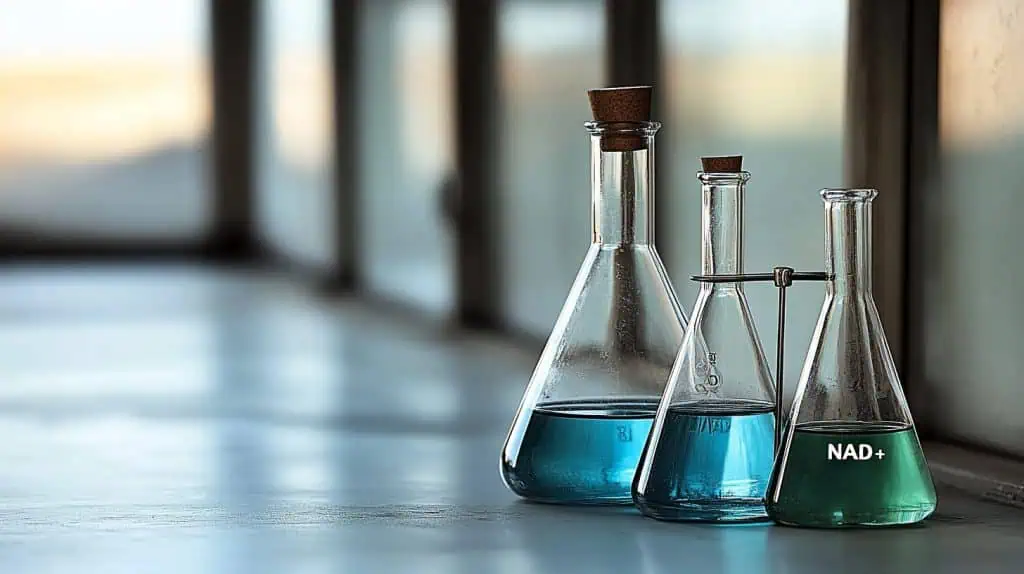I know, I know, it sounds like a button you press on the stereo to add bass. NAD+ is, in fact, a coenzyme and it’s short for Nicotinamide Adenine Dinucleotide.
And, if you’re thinking, “I’ve never heard of it, it can’t be important”, join the club.
However, NAD+ is found in every single cell in your body, and how much of it you have correlates with how your body is aging. It’s a big deal.
Let’s find out why NAD+ is so important and how you can get more of it.
If boosting NAD+ piques your interest try my beginners’ guide on how to take anti-aging supplements or look at my list of the best anti-aging supplements,
And see which other nutrients could help you live longer from our full list of anti-aging supplements.

Understanding NAD+ and Aging
Importance of NAD+ Levels
NAD+ is crucial to creating energy in your body and maintaining your health as you grow older. I’m talking DNA repair, metabolism, body clock, hormone signaling, inflammation, and more.
And guess what? Surprise, surprise, levels decline as we age. (Must this happen with everything?)
NAD+ is involved in hundreds of metabolic processes like cellular energy and mitochondrial health. It also teams up with proteins like sirtuins that regulate metabolism and seem to slow down those aging changes.
Impact of NAD+ Decline on Aging
Mitochondria are the cells’ engines. The crippling condition Long Covid, which left millions around the world struggling with chronic fatigue after the pandemic, is thought to be caused by mitochondrial dysfunction.
So they’re important.
When NAD+ levels dip, so too do our mitochondrial energy levels. It also slows down our cells’ ability to repair themselves (Vail Health). This slump is a backstage pass to a host of age-related issues.
|
Cellular Process |
Impact of NAD+ Decline |
|---|---|
|
Mitochondrial Function |
Power down, energy takes a hit |
|
DNA Repair |
Lousy repair job, risking cell mutations |
|
Metabolism |
Sluggish pace, helping those pounds creep on |
|
Circadian Rhythm |
Clock’s outta whack, throwing sleep out the window |
|
Protein Support (e.g., Sirtuins) |
Less control over aging, speeds up the wrinkles |
When NAD+ decreases, it can lead to a breakdown in bodily function or even age-related diseases. From a snail-paced metabolism to sleep clocks going haywire and a decrease in metabolic health. Something to look forward to.
Except, of course, that’s where supplements come in.
NAD+ Supplements for Anti-Aging
As time has added years to my life, I’ve been on a personal mission to keep the aging process in check and boost my health. One thing that caught my eye in this pursuit is NAD+ supplements. Let’s talk about how they might just be the secret sauce to staying young.
NAD+ Precursors
‘Precursors’ are substances that can form different substances. We’re interested in the following substances, which can all produce extra NAD:
- Tryptophan
- NMN (Nicotinamide Mononucleotide)
- NR (Nicotinamide Riboside)
- Niacin
- Niacinamide
NR and NMN are the fan favorites because they seem to increase mitochondrial activity, DNA repair, and maintain your cells (AZ IV Medics).
From what Verywell Health says, these precursors could slow down aging and fend off age-related illnesses. The science looks good, but the problem is that trials have been small and limited.
How to Boost NAD Levels Naturally
- Nutrition
Good food sources of tryptophan and niacin include the following:
- Beef
- Chicken
- Fish
- Turkey
Though the levels are much lower, you can also find niacin in the following vegetarian foods:
- Dairy products
- Enriched grains
- Fruit
- Legumes
- Nuts
- Seeds
- Soy products
- Vegetables
- Whole grains
2. Lifestyle changes
Intermittent fasting has been linked to increased NAD+ levels. However, I don’t recommend this, as studies show that this type of fasting can decrease your muscle mass.
Regular physical activity has also been shown to boost NAD+ levels, enhancing mitochondrial function and boosting your overall cellular health.
Potential Benefits of Increased NAD+
When scientists played with NAD+ levels in mice, it was like watching a time machine. Bringing their NAD+ back to youthful levels came with many perks (PubMed Central):
- Better heart health
- Turned back the clock on metabolic hiccups
- Stronger muscle power and stamina
- Increased mitochondrial function and ATP (cell energy factory) output
- Gave a helping hand to the brain and nerve cells, especially in Alzheimer’s cases
These findings are music to our (ever-growing) ears, as increasing NAD+ levels might just turn back the clock on our cells’ repair crew, helping with DNA patches and maintaining cellular health (Health).

Safety and Efficacy of NAD+ Supplements
Recommended Dosages
When it comes to NAD+ supplements, figuring out the right dosage can feel like decoding a riddle. There’s no definitive guide, mainly because the magic number for optimal benefits is yet to be discovered via large-scale human trials.
These supplements often include building blocks like nicotinamide riboside (NR) and nicotinamide mononucleotide (NMN), and the amount you should take varies based on your personal goals and circumstances.
If you’re part of the fabulous 50 and over club, here’s my tip: start slow. Dip your toes in the supplement pool rather than diving headfirst. Chat with your healthcare provider to avoid any nasty surprises.
Below are some common dosages based on what I’ve gathered from various studies and experts:
|
Supplement |
Typical Dosage |
|---|---|
|
NR (Nicotinamide Riboside) |
250 – 500 mg/day |
|
NMN (Nicotinamide Mononucleotide) |
250 – 500 mg/day |
Consider this table more like a blueprint than a rulebook. What fits one person like a glove might not fit another. Your health status, current meds, and what you’re aiming for with these supplements all play a role.
If you want more nitty-gritty about dosages, especially for those of us in the second half of life, see my 50+ supplement dosage guide for the full scoop.
Side Effects and Considerations
NAD+ supplements could hold many benefits to aging, but there are potential side effects to consider:
- Flushing/flushes
- Headache
- Nausea
- Fatigue
But, things can get more serious with risks like:
- Liver issues
- Tumor development
It can’t be stressed enough: get your healthcare provider’s blessing before considering NAD+.
A few key cautions to keep in mind:
- Medication Mix-ups: Your current prescriptions might not mix well with NAD+ supplements, potentially making them less effective or causing other effects.
- Existing Health Problems: Those with a medical history need to tread carefully and get their doctor’s approval before starting.
- Supplement Quality: Not all supplements are created equal. Picking the good stuff matters. For more, see my quality supplements guide.
Being informed is your best ally in making good health choices, so I also have a supplement interactions guide for seniors you can look at.

Research on NAD+ and Longevity
So, there’s a growing buzz that NAD supplements might just be a game-changer in anti-aging. Both animal and human studies are showing promising signs, but it’s still early days.
Studies on NAD+ and Lifespan
NAD+ isn’t just hard at work in the cells of us humans. You can also find it in other mammals, yeast, bacteria, and even plants. Scientists have been examining some of them to see if we can learn anything for further human trials.
They say that increasing NAD+ levels could stretch our timelines (Vail Health).
- Yeast and Worms: In basic, life-on-earth terms, NAD+ seems to help them live longer by turning up their cell repair function.
- Mice: When we step it up to mice, things get interesting. Bringing NAD+ back to its youthful levels seems to increase fertility, heart health, muscle strength, energy engines (mitochondria), and even brain health (NCBI).
Let’s look at lifespan:
|
Organism |
Lifespan Increase |
|---|---|
|
Yeast |
30% |
|
Worms |
20% |
|
Mice |
Variable increases |
Human Clinical Trials and Outcomes
Humans and mice share about 97.5% of their DNA, but animals are not humans, and we won’t necessarily replicate what we’ve seen in animal testing. That said, early human clinical trials have offered some hopeful results so far:
- Cardiovascular Health: Some trials are showing that people, especially those with heart trouble, have better heart health and less inflammation (NCBI).
- Metabolic Function: Some studies say NAD+ might help boost how our cells burn energy.
- Cognitive Benefits: Early results suggest better thinking skills and maybe even help with nerve repair (NCBI).
In human trials, they often use NAD+ precursors like Nicotinamide Riboside (NR) and Nicotinamide Mononucleotide (NMN), and these are showing promise in anti-aging.
For more down this rabbit hole, see my articles on NMN Supplements and what Resveratrol can do for the aging game.
NAD+ for Skin Health
NAD+ might help undo some of the problems caused by too much sun. There have also been some interesting developments in NAD+ creams for skin problems like psoriasis (Health).
|
NAD+ Precursor |
Benefits |
|---|---|
|
Nicotinamide Riboside (NR) |
Tends to boost repair of sun-damaged skin, could slow down early aging |
|
Nicotinamide Mononucleotide (NMN) |
Shows promise for tackling issues like psoriasis |
If you’re interested in anti-aging, you might want to read my article on vitamins for healthy aging.
The Bottom Line
We know that NAD+ is essential for maintaining our health and regulating things like metabolism and circadian rhythm. And as we age, levels of NAD+ decline.
Reduced levels of NAD+ are associated with conditions like diabetes, mental decline, and metabolic conditions like heart disease.
Niacin, niacinamide, NMN, and NR can all boost levels of NAD+ in the body. So, in theory, these supplements could slow the effects of aging and combat diseases. However, more research is needed before we can 100% make that link.
Without human clinical trials, informed decisions cannot yet be made about the risks versus benefits of NAD+ supplements.
Editorial Process
We believe in writing honest and unbiased reviews based on real-world experience. For more details, read our editorial process.
Some of the links in this article may be affiliate links, which can compensate us at no cost to you if you make a purchase. These are products we’ve personally used and tested. This site is not intended to provide financial or health advice. You can read our affiliate disclosure in our privacy policy.
Richard Riviere is a former 9-5er who was fat, frazzled, and fifty.
“There has to be more to life than this”, he decided. So, quit his 30-year career to research how to become healthier and wealthier after 50.
He now teaches other midlifers how to start living life on their own terms again.
